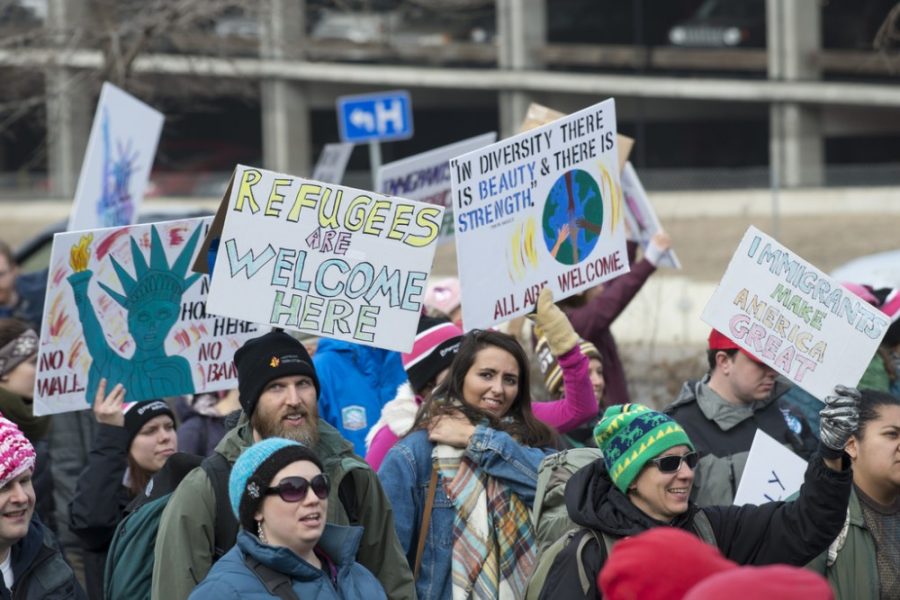In two new scientific papers, Alex Braithwaite and Faten Ghosn, both professors in the UA School of Government and Public Policy, examined the factors that affect public opinion toward hosting refugees.
As part of the project, the team traveled to Lebanon in the summer of 2017 to survey over 2,000 Lebanese citizens on their opinions on the country’s over one million Syrian refugees displaced by the ongoing Syrian Civil War.
RELATED: UA professors receive $1.4 million grant to study motive and movement of refugees
Braithwaite and Ghosn chose to conduct their research in Lebanon for a couple of reasons. First, Lebanon has the most refugees per capita of any country in the world. The majority of the world’s refugee populations are hosted in countries neighboring conflicts. Also, many Lebanese citizens themselves experienced displacement and violence during the Lebanese Civil War.
“The country hosts over one million Syrian refugees and has a population of only four to five million,” Braithwaite said. “If there are going to be patterns to identify on public opinion of refugees, they should be present in Lebanon.”
Braithwaite and Ghosn wanted to investigate three theories of how public opinion on refugees is formed and impacted.
The first theory, empathy theory, predicates that those Lebanese who were once refugees themselves would be more likely to support the Syrian refugees.
“We did not find that those who had experiences of violence and displacement were more willing to host refugees,” Braithwaite said. “Our survey comes six years into the process of hosting refugees, so if there were an empathy effect, it was diminished.”
Braithwaite and Ghosn did find evidence for their second theory: contact theory.
Contact theory suggests that positive contact between citizens and refugees helps break stereotypes and reduce prejudices and conflict.
“When Syrian refugees came to Lebanon, the unemployment doubled and debt widened. The Lebanese are economically feeling an impact,” Ghosn said. “If you are close with someone who is a Syrian refugee, it is hard for you to not think about them when thinking about hosting refugees in general.”
The last part of Braithwaite and Ghosn’s work examines how government or non-profit organization policies and the media can influence opinions on refugees in a country.
In past research, one way conflicts spread to a neighboring country, also known as spillover, is due to the movement of people or refugees.
According to Braithwaite, these increases in violence due to refugee influxes are often actually violence directed at the refugee populations themselves, in part due to scapegoating by media and politicians.
While Braithwaite and Ghosn do not try to discount security risks, their research found that government policies that target refugees indiscriminately do not reduce the perception of threats among citizens.
“International labor organizations are recognizing the economy is bad for both Lebanese citizens and Syrian refugees,” Ghosn said. “They fund projects that make employers hire both Syrian refugees and Lebanese, which provides beneficial contact and economic support.”
Policies like these that facilitate positive contact and help lessen economic competition can help reduce conflict and integrate refugee populations.
Braithwaite and Ghosn said they hope their research will be applicable to studies on public perception of refugees elsewhere.
According to Ghosn, the United States hosts only a small refugee population, and their expected economic and security impact are extremely low because of a disconnect between the realities and politics of hosting refugees.
Braithwaite pointed to El Paso, Texas, as a great example for contact theory at work. The U.S. border town has experienced low levels of crime thanks to cross border contacts Braithwaite said.
RELATED: Migration, the media and militarization
While in Lebanon, Braithwaite and Ghosn’s team also interviewed Syrian refugees to study how and why refugees make the decision to flee from their homes.
“Many Syrian refugees want to go home and even regret having left,” Ghosn said. “It is important to understand what refugees are really feeling and wanting and not just project our stereotypes.”
Braithwaite and Ghosn will begin to examine the results of those surveys this summer.
Braithwaite and Ghosn’s work is supported by a close to $1.4 million Minerva Initiative grant from the Department of Defense to study refugee flows and instability from 1990 to today.
Follow Randall Eck on Twitter









